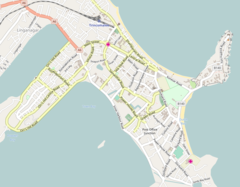This article has multiple issues. Please help improve it or discuss these issues on the talk page. (Learn how and when to remove these messages)
|
Gokanna Viharaya (Sinhala: ගෝකන්න විහාරය) was an ancient Buddhist temple located in Trincomalee in the Eastern Province of Sri Lanka. The temple lies in the premises of Fort Fredrick close to the fort entrance.
| Gokanna Historic Buddhist Temple | |
|---|---|
ගෝකන්න විහාරය | |
 The entrance way of the Vihara preises | |
| Religion | |
| Affiliation | Buddhism |
| District | Trincomalee |
| Province | Eastern Province, Sri Lanka |
| Location | |
| Location | Fort Fredrick, Trincomalee, Sri Lanka |
| Geographic coordinates | 08°34′36.4″N 81°14′29.8″E / 8.576778°N 81.241611°E |
| Architecture | |
| Type | Buddhist Temple |
| Completed | 3rd century AD |
History
editAccording to the references of Sri Lanka Archaeological Department, Trincomalee had been known as Gokanna in the ancient times. The Mahavamsa chronicle recounts that the Gokanna Vihara was built by King Mahasen in the 3rd century (275–301 AD)[1][2] by destroying a Shiva temple that existed on the Swami Rock, where the Koneswaram Kovil stands today.[3][4] It is said that in the reign of King Agbo V, the temple was modified by adding a preaching hall.
A Tamil rock inscription which was found near the main entrance to the fort, states that the Hindu temple that existed at this place was destroyed by the Portuguese. The Hindu temple was later rebuilt in 1963.
Present
editIn correspondence from the Government Agent of Trincomalee, dated 8 October 1964, to the Secretary, Ministry of Cultural Affairs, it states that the Bodhi tree in front of the Koneswaram Kovil had been destroyed.[5] Recently divers have discovered submerged Buddhist and Hindu sculptures in a nearby sea area and brought them ashore.[citation needed]
References
edit- ^ "satmag01". Island.lk. Retrieved 28 October 2014.
- ^ "Funday Times". Sundaytimes.lk. Retrieved 28 October 2014.
- ^ "The existence of a Siva temple at Gokarna in the time of Mahasena (274–301) is vouched for by the Mahavamsa, which mentions the construction by Mahasena of a vihara at Gokarna after the destruction of a temple of god there (Mv. XXXVII: 41). The commentary on the Mahavamsa states that this temple of god was a Sivalinga temple (Mahavamsa-tika: 685)." Indrapala, K. (2005). The Evolution of an Ethnic Identity - The Tamils of Sri Lanka 300 B.C.E to 1200 C.E. p. 382
- ^ "According to the Tika the Gokanna-Vihara is situated on the coast of the "Eastern Sea", the two other viharas in Rohana. The Tika then adds: evam sabbattha Lankadipamhi kuditthikanam alayam viddhamsetva, Sivalingadayo nasetva buddhasasanam eva patitthapesi ‘everywhere in the island of Lanka he established the doctrine of the Buddha, having destroyed the temples of the unbelievers, i.e. having abolished the phallic symbols of Siva and so forth." http://mahavamsa.org/mahavamsa/original-version/37-king-mahasena/
- ^ Cyril Mathew (1983). An Appeal to UNESCO to Safeguard and Preserve the Cultural Property in Sri Lanka Endangered by Racial Prejudice, Unlawful Occupation, Or Wilful Destruction. Retrieved 28 October 2014.
